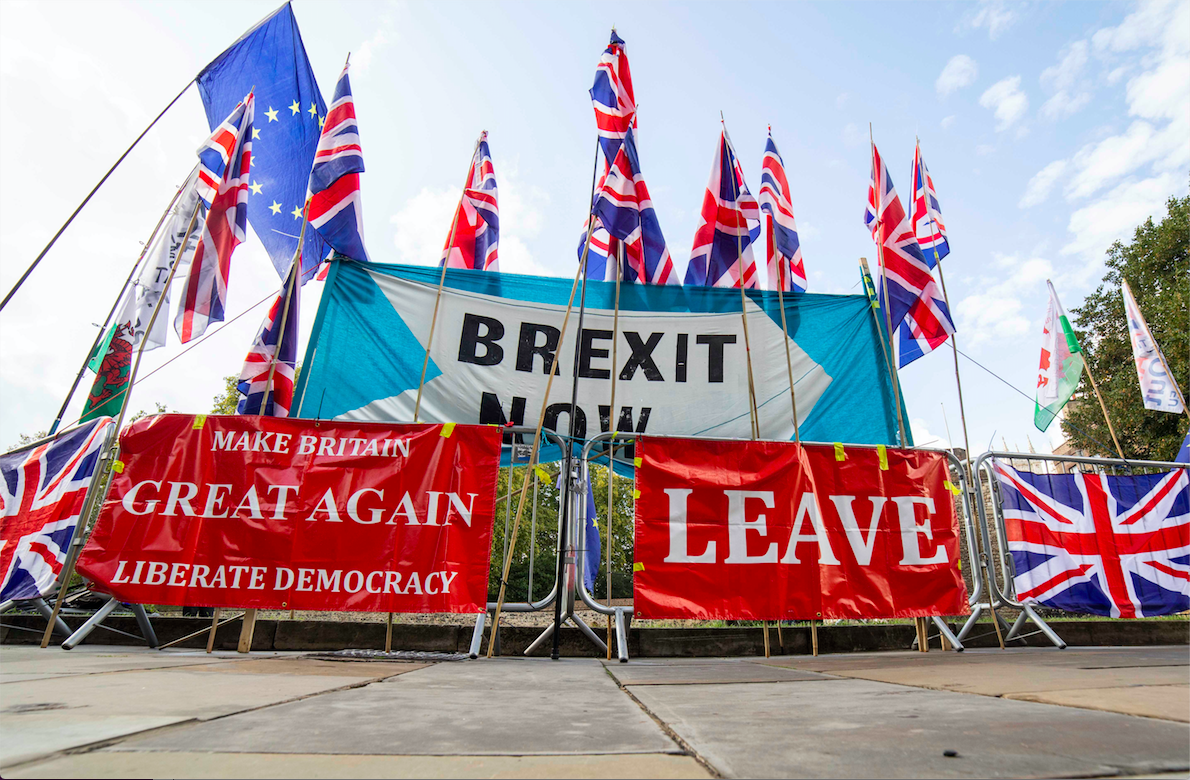Brexit remains key issue as Britons vote in Thursday’s general election

A few minutes every morning is all you need.
Stay up to date on the world's Headlines and Human Stories. It's fun, it's factual, it's fluff-free.
On Thursday, December 12, British citizens will vote in yet another general election that could affect the fate of Brexit. Prime Minister Boris Johnson has promised that the United Kingdom will leave the European Union entirely by December 2020 if his party wins. However, experts have questioned this timeline and the opposition has said the people should get a second vote.
The system of government in the United Kingdom is a parliamentary one with a House of Commons and a prime minister. There is a great number of political parties vying to get their candidates elected as members of parliament (MPs). The two largest parties are the Conservative Party (also known as the Tories), led by current Prime Minister Johnson, and the Labour Party, headed by Jeremy Corbyn.
Although there are many important issues in this election – including the fate of the National Health Service (NHS) – Brexit has been central to much of the discussion. Johnson is seeking to pass a Brexit deal by January 31, while his main opponent, Corbyn, has stated he would seek a second referendum. For this reason, the election has been seen as a choice between leaving the European Union in January or voting on Brexit again.
[article_ad]
Corbyn’s controversial neutrality
On the day of the original referendum, Corbyn tweeted that he voted to remain because the “EU provides the best framework to meet the challenges of our time.” However, he was criticized by members of his own party for being “lukewarm” on remaining in the European Union during the Brexit campaign. Now in the run-up to Thursday’s election, Corbyn has said he will remain “neutral” if there is a second vote and not advocate for one side over the other.
As Remainers – person who voted for the United Kingdom to remain in the European Union in the 2016 referendum, look for an alternative to Johnson and his pro-Leave stance, Corbyn’s unwillingness to take a firm public position on the issue could be a political liability. Without a strong stance on either side, those who oppose the Conservative Party may vote for other parties – including the Liberal Democrats who are strongly Remain. This could undermine Labour’s already slim chances of winning a majority.
As the election approaches, the Conservative Party has held onto a strong lead over Labour and the other parties, but the polls have been narrowing.
A timeline of Brexit
Well before Britons voted in the 2016 referendum to leave the European Union, the topic had generated regular debate. In 2015, after being re-elected in a general election, then Prime Minister David Cameron, leader of the Conservative Party, called for a referendum that would allow British citizens direct vote on whether the country would leave or remain in the European Union. In the run-up to the vote, two campaigns emerged on either side of the debate: Leave and Remain.
The vote, which occurred on June 23, 2016, resulted in 52% for Leave, 48% for Remain. There were 30 million votes cast, representing 72% of the country. In the wake of the referendum, Cameron, who was pro-Remain, stepped down as prime minister. He resigned on July 13, 2016 and was succeeded by another member of the Tories, Theresa May. Despite having spoken out against leaving the European Union, May promised to finalize the deal.
May called for a snap election in order to give herself a full five-year term and strengthen her hand for Brexit negotiations. The second general election in just over two years was held on June 6, 2017, but even though her Conservative Party remained the largest single party in parliament, it lost the majority. May had bought herself more time in office but lost support within her own government.
[article_ad]
What is Article 50?
The Brexit referendum was non-binding and therefore had no legal requirement that the government follows through with the decision. However, in March 2017, Theresa May triggered what is known as Article 50.
This article is part of the Treaty of Lisbon, an agreement signed and ratified by all the members of the European Union. Article 50 is the sole legal means for a nation to leave the European Union, and once May triggered it, the United Kingdom was legally bound to leave by March 29, 2019.
This gave the UK and the EU two years to negotiate a deal that would cover new trade agreements, citizen rights, and more. However, when May brought the negotiated deal for Britain’s exit to the House of Commons in January 2019, it was voted down in the largest loss in British government history. After losing a second vote, May requested an extension to June 30, 2019, which was further extended to October 31, 2019 by Donald Tusk, the European Council president.
Boris Johnson as prime minister
When it became clear that May would be unable to get her deal passed through the House of Commons, she resigned as Prime Minister. She left the office on June 7 this year and was replaced by former Mayor of London and Conservative politician, Boris Johnson.
Johnson had been a vocal supporter of the Leave campaign and stated he was open to a no-deal Brexit – the UK leaving the EU and all its associated institutions with no agreements between the two bodies and no transition period. However, since taking office, Johnson has been unable to gain any traction on his Brexit deal and has been thwarted in his push for a no-deal exit by the House of Commons.
As a result, Johnson has called for this general election on December 12 – the third in five years. Although the vote is for MPs, it has been called the “Brexit election”, as many voters will be casting their votes based on which party they believe will deliver their preferred outcome.
[article_ad]




Comments ()